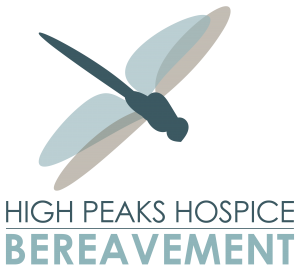
Grief is a natural part of losing someone you love. It can touch every part of life — emotional, physical, social, and spiritual. At High Peaks Hospice, we understand that the journey through loss looks different for everyone. Our role is to walk alongside you, offering care, understanding, and connection as you find your way forward.
Our Hospice Care Specialists provide bereavement support to families, caregivers, and loved ones for up to 13 months after a patient’s death. This support is offered at no cost and is available whether or not your loved one received in hospice services.
You are not alone – What Bereavement Support Looks Like
Each person experiences grief in their own way and at their own pace. Our Hospice Care Specialists are here to listen, offer comfort, and provide practical guidance and resources tailored to your needs.
Support may include:
- Individual or family check-ins by phone, mail, or in person
- Invitations to memorial or remembrance events honoring loved ones
- Grief support newsletters and educational materials to help you understand and process your grief
- Referrals to local counselors, groups, or spiritual resources if additional support is needed
Our Six-week Grief Support Groups
There is no right or wrong way to grieve. Some days may feel peaceful, others heavy — both are part of the healing process. Our team is here to support you with compassion and respect, helping you find moments of comfort and connection along the way.
High Peaks Hospice is offers six-week long grief support group for hospice bereavement clients and members of the community who are grieving the loss of a loved one. Rooted in compassion and guided by Dr. Alan Wolfelt’s grief framework, this group offers a supportive space to share, reflect, and connect—without pressure or expectations. Watch for session start dates and locations as they become available or connect with our bereavement team at 518-891-0606 to be invited to the next one.
To learn more about our services, please contact High Peaks Hospice at 518.891.0606 or bereavement@highpeakshospice.org.
Gentle Guidance for Healing
Healing from loss takes time, care, and patience. The following suggestions may help support your physical, emotional, and spiritual well-being as you move through grief.
Nourish your body. Eat balanced meals and talk with your healthcare provider about any vitamin needs.
Limit alcohol, caffeine, and sugar, especially if they increase anxiety or affect sleep.
Move regularly. Aim for light exercise, such as a brisk 30-minute walk, five days a week.
Support restful sleep. If insomnia is a concern, avoid protein after 5 p.m., as it can block tryptophan. Choose light carbohydrates in the evening, and limit alcohol, caffeine, and sugar.
Be kind to yourself. Spend at least ten minutes each day doing something that brings you peace or joy.
Create moments of stillness. Many find comfort in daily meditation or prayer, whether at the start or end of the day.
Stay organized gently. Each evening, jot down a list of tasks for the next day. Review and prioritize them in the morning.
Allow your emotions. Give yourself permission to grieve, to cry, to feel anger — all are natural parts of healing.
Seek supportive company. Spend time with people who respect your grief and can offer understanding and practical help.
Avoid major life changes (such as moving or changing jobs) until you feel emotionally ready.
Griever’s Bill of Rights
- You have the right to experience your own unique grief
- You have the right to talk about your grief
- You have the right to feel a multitude of emotions
- You have the right to be tolerant of your physical and emotional limits
- You have the right to experience “griefbursts”
- You have the right to make use of ritual
- You have the right to embrace your spirituality
- You have the right to search for meaning
- You have the right to treasure your memories
- You have the right to move forward your grief and heal
Recommended Resources for Grief and Loss
Websites:
Center for Loss & Life Transition www.centerforloss.com
Books:
It’s Okay That You’re Not Okay – Megan Devine
Bearing the Unberable – Joanne Cacciatore, PhD
Grieving is Loving – Joanne Cacciatore, PhD
On Griefand Grieving – Elizabeth Kubler-Ross and David Kessler
Understanding Your Grief by Alan D. Wolfeit, PhD
Permission to Mourn – Tom Zuba
For Children’s Grief Resources, please visit our Children’s Bereavmement Page HERE.
